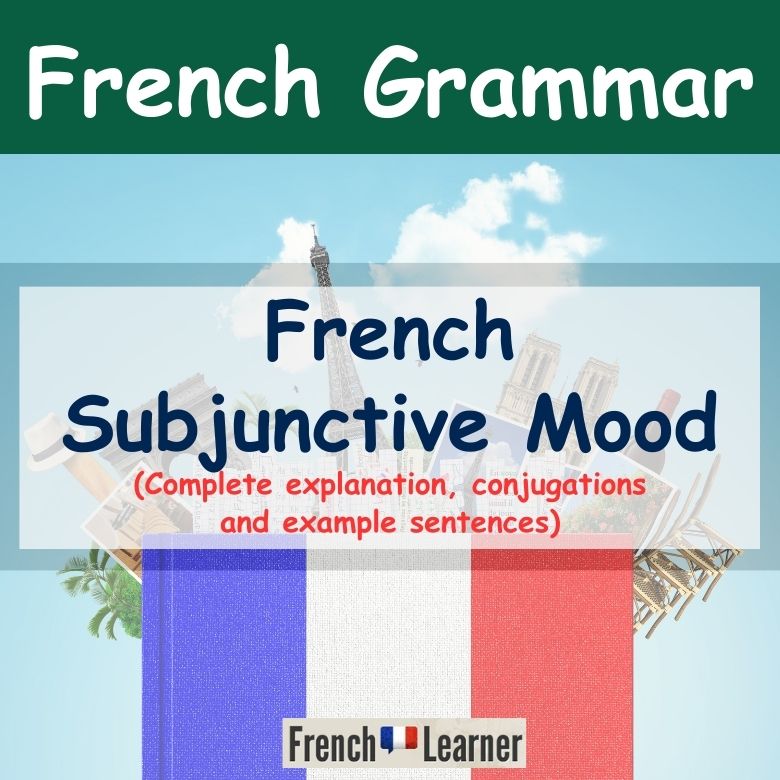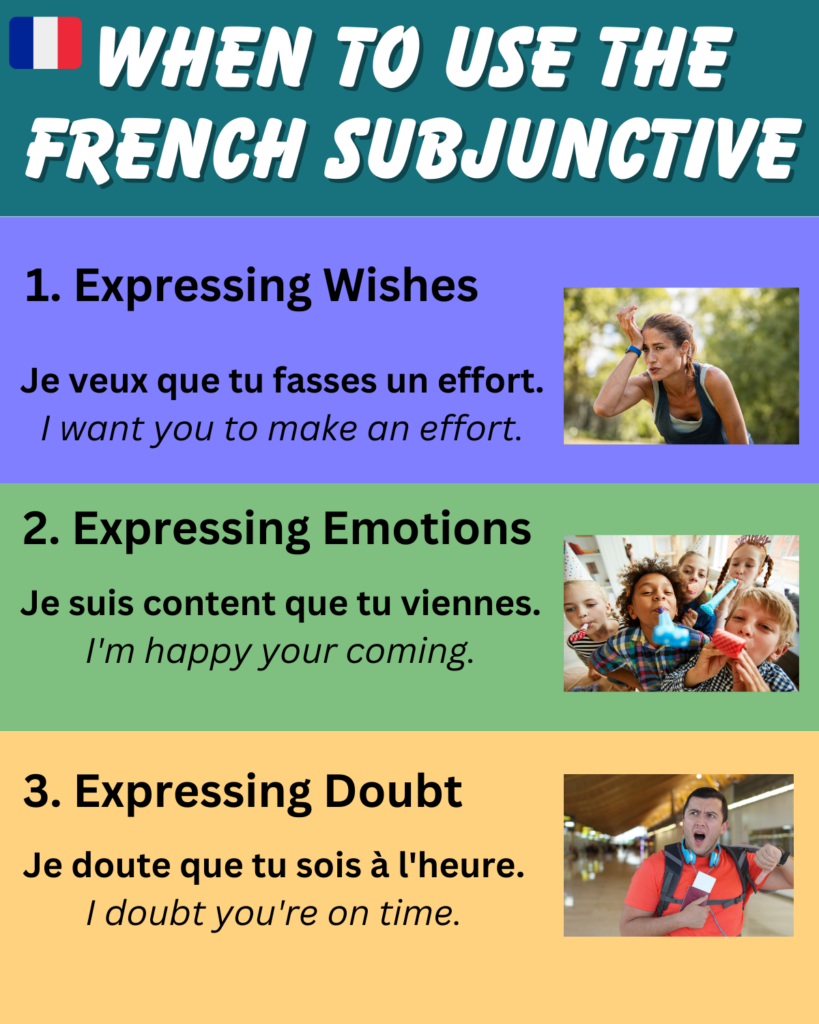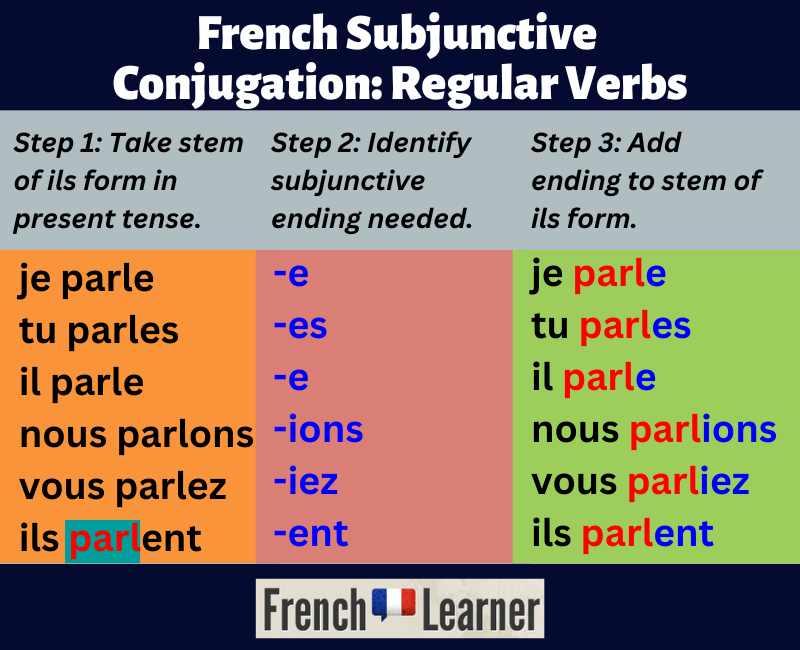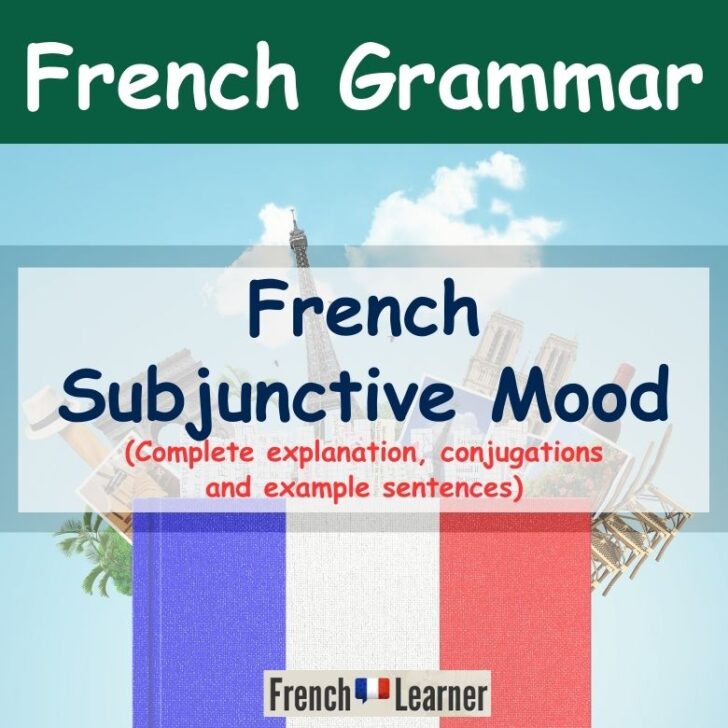The French subjunctive tense (or mood) is used to express wishes, emotions and doubts. For example, je veux que tu fasses te devoirs (I want you to do your homework). Many students have a hard time with the subjunctive because its conjugations are different from normal verb endings and there are many rules for when to use it.

What is the French subjunctive mood?
The French subjunctive (le subjonctif) is a mood. It called a mood because it is used to express the subject’s attitudes, feelings and perceptions. The French language utilizes the subjunctive in order to stress a sentence’s subjectivity (personal perceptions). An example of the subjunctive is: Il faut que vous fassiez votre travail (You need to do your work).
Sentences including the subjunctive often include the word que (that). The French use the subjunctive to express the subject’s feelings regarding the other person.

More French subjunctive examples
In the example sentences below, the verb forms are different form the present tense (indicative). In addition, each sentence has two subjects separated by que (that).
- Je veux que tu fasses tes devoirs. I want you to do your homework.
- Je suis heureux que tu sois ici. I’m happy you’re here.
- Je doute qu’il vienne. I doubt he’s coming.
French subjunctive conjugation tables

For most French verbs, the subjunctive is formed by removing the -ent from the third-person plural (ils/elles) form in the present tense and adding the following subjunctive endings: -e, -es, -e, ions, -iez and -ent.
The pronunciation of the subjunctive is mostly based on the the pronunciation of the present tense ils forms.
The following table shows how to form the subjunctive for regular -er, -ir and -re verbs.
| PARLER TO SPEAK ils parlent | FINIR TO FINISH ils finissent | VENDRE TO SELL ils vendent |
| que je parle que tu parles qu'il/elle parle que nous parlions que vous parliez qu'ils/elles parlent | que je finisse que tu finisses qu'il/elle finisse que nous finissions que vous finissiez qu'ils/elles finissent | que je vende que tu vendes qu'il/elle vende que nous vendions que vous vendiez qu'ils/elle vendent |
The subjunctive conjugation of most irregular verbs is the same: Drop the -ent from the ils form in the present tense and add the subjunctive endings.
| ÉCRIRE TO WRITE ils écrivent | LIRE TO READ ils lisent | CONDUIRE TO DRIVE ils conduisent | DORMIR TO SLEEP ils dorment |
| que j'écrive que tu écrives qu'il écrive que nous écrivions que vous écriviez qu'ils écrivent | que je lise que tu lises qu'il lise que nous lisions que vous lisiez qu'ils lisent | que je conduise que tu conduises qu'il conduise que nous conduisions que vous conduisiez qu'ils conduisent | que je dorme que tu dormes qu'il dorme que nous dormions que vous dormiez qu'ils dorment |
Dual-stem subjunctive conjugations
Some verbs has dual-stem subjunctive conjugations.
This means that the je, tu, il, elle and ils subjunctive forms are made from the present tense ils form and the nous and vous subjunctive from are made from the present tense nous form.
In the table below, note that the je, tu, il, elle and ils subjunctive forms of boire (to drink) are based of the present tense ils form boivent and the nous and vous subjunctive forms are based off of the present tense nous form (buvons).
| BOIRE TO DRINK nous buvons ils boivent | VENIR TO COME nous venons ils viennent | PRENDRE TO TAKE nous prenons ils prennent |
| que je boive que tu boives qu'il boive que nous buvions que vous buviez qu'ils boivent | que je vienne que tu viennes qu'il vienne que nous venions que vous veniez qu'ils viennent | que je prenne que tu prennes qu'il prenne que nous prenions que vous preniez qu'ils prennent |
The subjunctive conjugations for the verbs aller (to go), avoir (to have), être (to be) and vouloir (to want) are irregular. They are not related to the present tense forms. In addition, they all have dual-stems.
| ALLER | AVOIR | ÊTRE | VOULOIR |
| que j'aille que tu ailles qu'il aille que nous allions que vous alliez qu'ils aillent | que j'aie que tu aies qu'il ait que nous ayons que vous ayez qu'ils aient | que je sois que tu sois qu'il soit que nous soyons que vous soyez qu'ils soient | que je veuille que tu veuilles qu'il veuille que nous voulions que vous vouliez qu'ils veuillent |
The verbs faire (to make, do), savoir (to know) and pouvoir (to be able, can) are irregular in that the subjunctive forms are not related to the present tense. Unlike the table above, they have a single subjunctive stem.
| FAIRE TO MAKE, DO | POUVOIR TO BE ABLE, CAN | SAVOIR TO KNOW |
| que je fasse que tu fasses qu'il/elle fasse que nous fassions que vous fassiez qu'ils/elles fassent | que je puisse que tu puisses qu'il/elle puisse que nous puissions que vous puissiez qu'ils/elles puissent | que je sache que tu saches qu'il/elle sache que nous sachions que vous sachiez qu'ils/elles sachent |
French subjunctive examples and phrases
In this section we will look at some example sentences and phrases which require the usage of the subjunctive.
The subjunctive usage can be broken down into three categories: Wish, emotion and doubt.
1. Examples of wish
In the example sentences, below, the subject is expressing a feeling of wishing or wanting, or making a demand.
- Je veux que tu sois plus polis. I want that you be more polite.
- J’exige que vous arriviez à l’heure. I demand that you arrive on time.
- Elle souhaite que je fasse mes devoirs. She wants me to to do my homework.
The following verbs require the subjunctive and fall in this “wish” category:
- aimer meiux que to prefer
- avoir besoin que to need
- demander que to request, ask for
- désirer que to want, wish, desire
- exiger que to demand
- ordonner que to order
- préférer que to prefer
- recommander que to recommend
- souhaiter que to wish
- suggérer que to suggest
- vouloir que to want
The following impersonal expressions (an expression that starts with il, meaning “it”) require the subjunctive.
- il faut que it’s necessary that, you have/one has to
- il est necessaire que it’s necessary that
- il est essentiel que it’s essential that
- il est important que it’s important that
- il est utile que it’s useful that
Il faut que is very common. It translates to “It’s necessary that” or “You have to”. This lesson covers il faut in detail.
- Il faut que tu sois à l’heure. You have to be on time.
- Il faut que je fasse attention. I need to pay attention.
2. Examples of emotion
The second group of phrases which require the subjunctive fall into the category of emotion (happy, sad, fearful, etc.).
- Je suis content qu’elle vienne. I’m happy she’s coming.
- Je suis triste qu’il ne soit pas avec nous. I’m sad he’s not with us.
- Elle a peur qu’il ne fasse pas son travail. She’s afraid he’s no doing his work.
The following verbs require the usage of the subjunctive and fall into the emotion category:
- avoir peur que to fear that
- craindre que to fear that
- s’étonner que to be surprised that
- être content, heureux que to be happy that
- être triste que to be sad that
- regretter que to be sorry that
- se plaindre que to complain that
- se fâcher que to be angry that
- être faché, fureux que to be angry that
- avoir honte que to be ashamed that
The following impersonal expressions use the subjunctive and fall into the emotion category:
- il est étonnant que it’s surprising that
- il est bizarre que it’s strange that
- il est curieux que it’s strange that
- il est ennuyeux que it’s annoying that
- il est énervant que it’s annoying that
- il est embêtant que it’s annoying that
Examples:
- Il est énervant qu’il fasse tant de bruit. It’s annoying that he’s making so much noise.
- Il est curieux qu’elle n’aille pas en France. It’s strange that she’s not going to France.
- Il est étonnant vous ne comprenniez pas. It’s surprising that you don’t understand.
3. Examples of doubt
The following example sentences require the usage of the subjunctive and fall into the category of doubt.
- Je doute qu’elle vienne avant 18h00. I doubt she’ll come before 6pm.
- Je ne pense pas qu’il comprenne ce qui se passe. I don’t think he knows what’s happening.
- Je ne suis pas convaincu que tu aies raison. I’m not convinced you’re right.
The following verbs are associated with doubt and require the subjunctive:
- nier que to deny that
- douter que to doubt that
- ne pas penser que to not think that
- ne pas croire que to not believe that
- ne pas être sûr(e)/certain(e) que to not be sure that
The following impersonal expressions require the subjunctive and fall into the category of doubt.
- il n’est pas certain que it’s not certain that
- il n’est pas sûr que it’s not sure that
- il n’est pas évident que it’s not obvious/evident that
- il n’est pas clair que it’s not clear that
- il n’est pas exact que it’s not accurate that
- il n’est pas vrai que it’s not true that
Two subjects vs. one subject
The subjunctive requires two subjects on both sides of the word que. However, when there is only one subject an infinitive is used.
For example, you cannot say, Je veux que j’aille au magasin for “I want that I go to the store”. In this situation use the infinitive of the verb: Je veux aller au magasin (I want to go to the store).
Verbs which take the indicative
There are some verbs which take the indicative. This is because there is no element of subjectivity, meaning they are not based on subjective personal or individual perceptions.
In other words, the topic that’s being discussed is known to be a reality.
1. Penser
The verb penser (to think) can take both the subjunctive or the indicative.
- Je pense que Paul est en retard. I think Paul is late.
- Je ne pense pas que Paul soit en retard. I don’t think Paul is late.
The first sentence starting with Je pense que (I think that), the indicative because what’s being expressed is believed to be a reality. Paul is late.
In the second sentence starting with Je ne pense pas que (I don’t think that), the subjunctive is used because whether Paul is late or not is subjective, meaning the topic is open for discussion.
2. Espérer
The verb espérer (to hope) take the indicative. This verb is often followed by the futur simple.
- J’espère qu’elle viendra. I hope she’ll come.
- J’espère que tu comprendras. I hope you’ll understand.
Impersonal expressions which take the indicative
The following impersonal expressions take the indicative as they suggest no element of subjectivity.
- Il est certain que it is certain that
- Il est évident que it is obvous that
- Il est probable que it is probable that
- Il est sûr que it is sure that
- Il est vrai que it is true that
- Il me semble que It seems to me that
Here are some example sentences.
- Il est certain que le subjonctif est très utile. It’s certain that the subjunctive is very useful.
- Il me semble que vous comprenez la leçon. It seems to me that you understand the lesson.
Past subjunctive
To form the past subjunctive, combine the auxiliary verb (avoir or être) in the present subjunctive with the verb’s past participle.
The French use the past subjunctive to create anteriority. The dependent clause (what comes after the que) occurs before the action of the main clause.
Past subjunctive conjugation and examples
For the past subjunctive, the auxiliary verb is expressed in the present subjunctive.
| Parler (to speak) | Venir (to come) | Se souvenir (to remember) |
| que j'aie parlé que tu aies parlé qu'il/elle ait parlé que nous ayons parlé que vous ayez parlé qu'ils aient parlé | que je sois venu(e) que tu sois venu(e) qu'il/elle soit venu(e) que nous soyons venu(e)s que vous soyez venu(e)(s) qu'ils/elles soient venu(e)s | que je me sois souvenu(e) que tu te sois souvenu(e) qu'il/elle se soit souvenu(e) que nous nous soyons souvenu(e)s que vous vous soyez souvenu(e)(s) qu'ils se soient souvenu(e)s |
Here are some example sentences using the past subjunctive.
- Je suis triste que tu sois tombé malade. I’m sorry you fell ill.
- Je suis ravi que vous soyez venus. I’m delighted you came.
- J’ai peur que tu aies manqué la réunion. I’m afraid you missed the meeting.
- Je suis content que tu sois revenu. I’m happy you came back.

